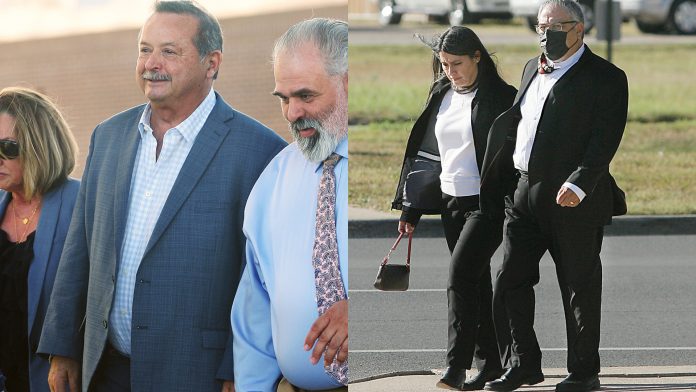
Despite concerted efforts to delay the day from arriving, two men convicted of defrauding the city of Weslaco in a large-scale public corruption scheme are scheduled to learn their punishment this week.
Former Hidalgo County Precinct 1 Commissioner Arturo “A.C.” Cuellar and Weslaco businessman Ricardo “Rick” Quintanilla are slated to be sentenced by U.S. District Judge Micaela Alvarez at 2 p.m. Wednesday.
On Oct. 20, 2022, a jury unanimously found the pair guilty of a combined 70 counts of bribery, money laundering and wire fraud in relation to the $38.5 million rehabilitation of the city of Weslaco’s water and wastewater infrastructure.
Prosecutors say the defendants, along with about a half dozen co-conspirators, bilked more than $4 million in the pay-to-play scheme that involved corrupt contractors and public officials.
The sentencing hearing — first scheduled by the judge the day the verdict came down — will hold, despite the defendants’ numerous attempts to postpone the proceedings.
Most recently, Alvarez denied a motion for a new trial by Quintanilla.
Though the motion was filed under seal, Alvarez alluded to Quintanilla’s arguments in an order handed down late Friday.
“As for the basis for the motion, Defendant Ricardo Quintanilla… argues that the verdict is against the great weight and preponderance of the evidence, that the Court committed error on multiple evidentiary issues, and that cumulatively, Quintanilla’s substantial rights were affected…” the order states.
Essentially, Quintanilla argued that the jury’s guilty verdict was not supported by the evidence and that Alvarez herself made critical mistakes during the case.
The document also implies that Quintanilla questioned the credibility of the witnesses against him.
That echoes allegations made during the seven-day-long trial — thinly veiled implications that both the judge and federal prosecutors had kept key evidence from the jury.
In particular, Carlos A. Garcia, who represents Cuellar, requested a mistrial on the last day of testimony.
The move came during a terse exchange when Alvarez denied Garcia’s request to question an FBI agent over an allegedly prejudicial statement uttered during an interview with A.C. Cuellar’s cousin, John F. Cuellar.
John F. Cuellar pleaded guilty in 2019 and admitted to using his position as the District 1 Weslaco city commissioner in the bribery conspiracy. He ultimately testified against A.C. and awaits sentencing.
Garcia argued that his inability to question the agent about the statement in front of the jury violated his client’s Sixth Amendment rights.
As the trial progressed, Quintanilla’s attorney, Jaime Peña, also appeared to adjust his strategy in response to how the judge ruled over various defense objections.
It began with Peña deferring, then outright abandoning making opening remarks on behalf of his client.
Later, when it was the defense’s turn to call witnesses, Peña declined to call anyone.
During one of the many bench conferences to occur throughout the trial, Peña mentioned the possibility of calling a forensic accountant named Mariela Ruiz as an expert witness.
But neither the jury nor the public are privy to such conferences when they occur.
The court transcripts of that conversation reveal, however, that Peña worried Ruiz’s testimony would “inject” a man named Sunil Wadhwani into the trial.
In May 2020, Wadhwani pleaded guilty to a similar bribery scheme related to the construction of a Motel 6 in Weslaco. His co-defendant in that case is Quintanilla, who has maintained his innocence.
Though prosecutors officially linked the two cases shortly after charges were unsealed in 2019, Alvarez prohibited any mention of the Motel 6 case at the start of the water plant bribery trial.
In her analysis of Quintanilla’s Nov. 3, 2022, motion for a new trial, Alvarez stated she found his arguments about judicial error and non-credible witnesses unconvincing.
“(T)he Court having weighed the evidence, considered the credibility of the witnesses, and the alleged errors, finds that there is no miscarriage of justice in letting the verdict stand. The motion for a new trial is DENIED,” Alvarez stated.
The judge similarly denied motions by both Quintanilla and Cuellar to delay the sentencing hearing for at least four months.
Alvarez excoriated the pair for the arguments made in their separate motions.
“(B)oth Defendants assert additional time is needed to review victim impact statements, yet both acknowledge that no such statements have been included in the Pre-Sentence Investigation Report,” Alvarez stated in a Jan. 9 order denying the postponement.
Additionally, Cuellar asked for more time so that his new attorneys — powerhouses from the San Antonio law firm, Goldstein & Orr — could review the trial transcripts.
The attorneys said they had been unable to access the transcripts, which were posted to the case docket on Nov. 29, 2022.
“It is obvious to the Court that counsel is not reviewing the record they claim is so critical to adequately represent their client,” Alvarez stated.
Despite the denial, the attorneys filed an advisory Thursday explaining the steps they had taken in trying to obtain the transcripts, including via PACER, the publicly accessible online repository for federal court records.
The firm’s attempts to access the transcripts via PACER had been met with error messages that they did “not have access to this transcript.”
The Monitor accessed the transcripts on PACER in late December via a public kiosk inside the U.S. District Clerk’s Office. However, subsequent attempts to view them via PACER on private computers yielded similar error messages.
Read the latest update here:
Former Hidalgo County commissioner gets 20 years in Weslaco bribery scandal



